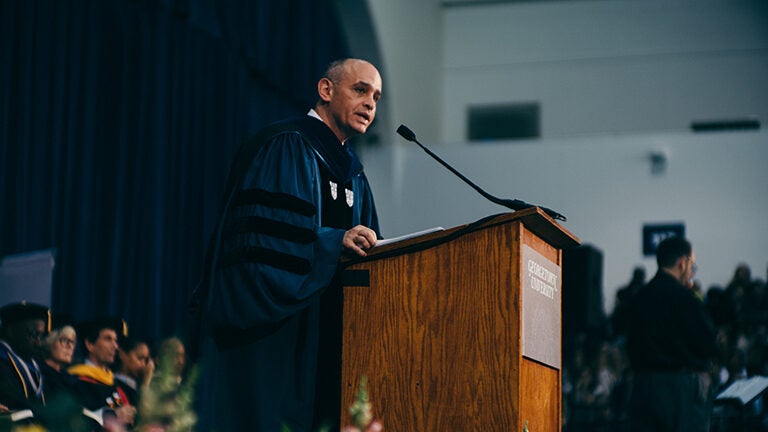Q & A: Dean Chris Celenza
August 24, 2018 — With the start of the academic year just around the corner, Dean Christopher S. Celenza agreed to sit for an interview on the state of Georgetown College. Read on for Dean Celenza’s reflections on his first year in office, his future plans, a message to incoming first-years, and more.
What have you learned in your first year at Georgetown?
One of the most notable aspects of my first year was getting a sense of Georgetown University and the College. There’s this sentiment — beyond affection, it’s a devotion to Georgetown. A lot of it is rooted in our Jesuit, Catholic identity, with its heritage of service and social justice. That all would’ve been hard for me to understand without experiencing it, so a lot of the first year had to do with getting to know that aspect of campus life.
A second thing that was really meaningful was getting to know all our wonderful faculty members. We have 26 academic departments and 12 interdisciplinary programs in the College. It’s been great seeing this vast diversity of interests that are represented in the College’s faculty.
I’ve also really enjoyed discovering just how central the College is to the Georgetown experience. Our vast array of disciplines — humanities, social sciences, and natural sciences — are central in so many ways to the university’s outstanding culture of research and teaching.
What should returning students expect in the next year?
We’ve come to the conclusion in the Dean’s Office that one of the best ways for students to learn is to do so actively and experientially. So we spent some time last year doing a survey of undergraduate research — where it’s being done, how it’s being done, and so on. This year, we’re planning on taking the results of that survey and using it to inform how we expand research opportunities for our students.
Another thing that a lot of us have been confronted with — and our students and alumni will be confronted with as well — is the problem of information literacy. How do you make meaning when there are so many forms of media through which information comes to you? My hope is that we can think collectively in the College — with the aid of our excellent academic departments — on how we can do more now to prepare our students to understand the modern media ecosystem. So I’m hoping to engage people more on that front.
Finally, the student experience is incredibly important to us at the College, so we’ve restructured our office to better serve students. Sue Lorenson has taken on a new role as Vice Dean, where she’ll help shape the future of the undergraduate experience, and we’ve added new academic advisors to ensure our students get the attention they need.
What will you be teaching this fall?
I’m teaching an Ignatius Seminar called “Thinking Through Writing.” We’ll be meeting weekly in the Booth Family Center for Special Collections in Lauinger library. It’s a seminar with a few different purposes.
First, we’ll be talking about intellectual history — the history of the way scholars think, and what they’ve thought about over time, from the era of Plato to the era of the Italian Renaissance.
But an underlying theme of the course is to see how the enterprise of writing inflected the thinking of the people we’ll be studying. What did it mean to write on papyrus? To dictate your work to someone else? To write on an early codex? We’re thinking about how the medium a person works with inflects how they express themselves — and maybe imposes channels and limits on how they think.
The third purpose is for students to come away with a deeper reflection not only on the issues our thinkers talk about, but also on the linking of intellectual history and the history of media. They’ll look at how changes in how we store information affect their own writing, and their own thinking. So we’ll look at papyri, replicas of papyri, early manuscripts, and early printed books. We’ll even make some field trips to places like the Library of Congress and the Folger Library.
Do you have any messages for incoming students?
Take a breath. You’re here. Reach out and meet people. Don’t forget that your professors really want to hear from you. Some of these field-leading scholars are teaching your classes — go to their office hours. Get to know them from day one.
Remember that you’re in one of the greatest capital cities on Earth. There’s a lot to do here on our campus, but don’t forget that there’s a lot to do in the city of Washington, D.C. as well. Take a trip to one of the Smithsonian museums — they’re free. Visit the Library of Congress and take a look at what they have. Don’t lose that opportunity to be integrated into the city, because it’s such an asset to what we have here.
Get to know a Jesuit. This is apart from any questions about personal faith — just reach out and get to know that part of our university’s heritage. The more you’re here, the more you’ll see that the Jesuit tradition is part of everything we do. It has a meaningful but not always visible imprint here, and the more you can identify that, the better off you’ll be.
Interview conducted by Patrick Curran and edited for length and clarity.
